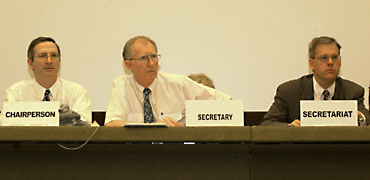|
Financial resources and mechanisms, and interim financial arrangements
|
 John Whitelaw, UNEP Chemicals, on behalf of the Secretariat, introduced
documents related to financial resources and mechanisms and interim
financial arrangements (UNEP/POPS/INC.6/12, UNEP/POPS/INC.6/13 and
UNEP/POPS/INC.6/INF/9).
John Whitelaw, UNEP Chemicals, on behalf of the Secretariat, introduced
documents related to financial resources and mechanisms and interim
financial arrangements (UNEP/POPS/INC.6/12, UNEP/POPS/INC.6/13 and
UNEP/POPS/INC.6/INF/9). |
| |
|
Avani
Vaish, GEF (above left), gave a presentation on the GEF and
global conventions and noted two proposed new focal areas: land degradation
and POPs. He stressed that the GEF is country driven and assists developing
countries and countries with economies in transition in implementing
the Convention. He called attention to a Memorandum of Understanding
(MOU) between the COP and the GEF. Laurent Granier, GEF (right),
reviewed its report to the INC (UNEP/POPS/INC.6/INF/9) and stressed
that draft elements for an operational programme should be revised
before being tabled.
 Listen
to the GEF presentations Listen
to the GEF presentations
 Responding to questions, Vaish explained that as with two other
conventions, the GEF and the convention secretariats drafted an
MOU together. He described the content of the MOU and stressed that
it is not a guidance for the financial mechanism. The Secretariat
reiterated that COP-1 has to give guidance to the GEF and take a
decision on the final form of the financial mechanism, and that
at COP-2 the mechanism's performance will be evaluated.
Responding to questions, Vaish explained that as with two other
conventions, the GEF and the convention secretariats drafted an
MOU together. He described the content of the MOU and stressed that
it is not a guidance for the financial mechanism. The Secretariat
reiterated that COP-1 has to give guidance to the GEF and take a
decision on the final form of the financial mechanism, and that
at COP-2 the mechanism's performance will be evaluated.
|
|













